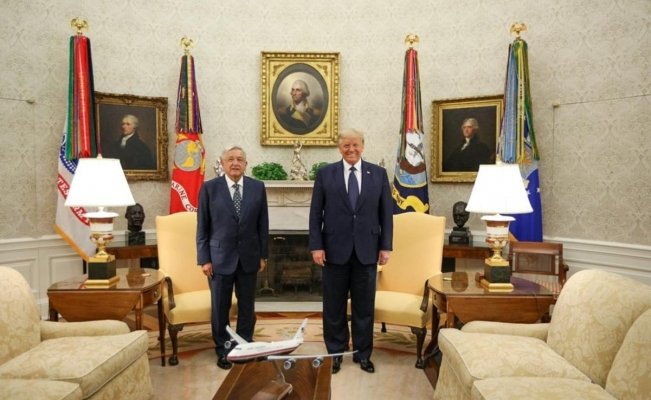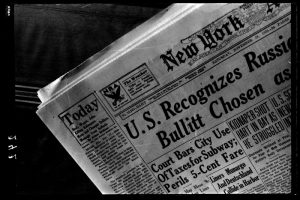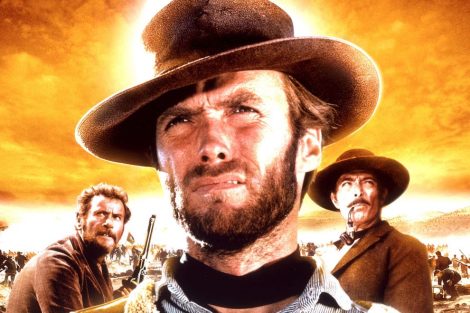In order to understand the relationship between The United States and Mexico, we must go beyond the historical scars and the levels of mutual ignorance and consider the enormous tangle of economic and social interests that, above all, are define it. Afar both countries leaders’ populist style, history and blood give this relation it´s particular rhythm because, at the end, geography condemns us all to a shared future.
Once upon a time there was a vigorous emperor who promised that, thanks to the discovery of enormous treasures underground, all his subjects would have wealth and happiness. In his book Shah of Shahs, Ryszard Kapuściński makes the fantastic story of the modernizing adventure of Shah Muhammad Reza Phalevi in the framework of post-World War II international economic expansion.
The story of the Polish journalist is about Iran and revolves around the moment when the Islamic revolution overthrew the educated emperor in Switzerland after his chaotic attempt to find a shortcut to the historical development of his country in order to transform it, overnight, from a poor and religious nation into an industrialized and democratic one. It is, also and unintentionally, a faithful portrait of Mexico that José López Portillo governed.
In fact, around the world and throughout the past centuries, the stories about the explosive economic growth generated by the discovery of large oil fields are strikingly similar to each other: both the sudden enrichment of some, the unbridled corruption of many and the generalized violence that usually causes.
Self-defined as “the last president of the Revolution,” JLP once explained that, despite its enormous discretionary power, what a Mexican president ultimately does is learn to surf in the best way they can on the great waves of the world moment they rule. In particular, for him there were two major tsunamis that marked the world in the 70’s: the great hydrocarbon crisis in the rich countries and the relative weakness of “Yankee imperialism” in some regions of the planet.
It was the years immediately following the U.S. post-Vietnam depression. The Jimmy Carter years, the historic increase in gasoline prices, the Olympic massacre in Munich and the hostage crisis in Iran. It is then the historical record in the consumption of illicit drugs, of sexual liberation and, according to the radical right, the beginning of the end of Western civilization.
In those days, the United States presented itself to the world as the champion of (economic) freedom and democracy. Seen from the north, Mexico was a country of closed economy, populist and hegemonic party regime, not democratic of course.
Forty years later, the tenant in the White House is a celebrity character, friend of tyrants and promoter of an economic protectionism the size of China. Meanwhile, Mexico governs it, for the first time in 80 years, a president whose favorite mantra goes as this: “for the benefit of all, the poor come first”.
The particular way in which the Fourth Transformation tries to position itself with respect to those same large waves of the movement of social dynamics on the eve of the third decade of the 21st century reveals a project that is much more pragmatic – and perhaps risky – than what its main critics consider.
Marked since the beginning of his political biography by the energy issue, President López Obrador has always been convinced that ‘the best business in the world is oil. And the second-best business in the world is poorly managed oil´. Should be would be enough to remember his so-often quoted phrase to not be surprised at his war against the huachicol, his new refinery project and, in general, the economic model he promotes.
The stoic attitude assumed by President Obrador before the brutal anti-Mexican rhetoric of President Donald Trump would be inexplicable without the tacit recognition that the country’s great economic bet is to strengthen its economic relationship with the giant of the north. Coming from over a century old culture of anti-American imperialism it´s really amazing Obrador passive and humble response to Trump´s rhetoric. Therefore, forget about the Hugo Chavez o Fidel Castro´s model.
Subjected to tolerate the ideological offensive that criminalizes the globalization of the workforce, the Mexican government takes care of stopping the passage of hundreds of thousands of migrants and, with their actions, validates the racist rhetoric of the Lord of tweets. Soon enough, many in Mexican society will complain about the “bad men” from Honduras, Cuba and beyond. They, will be claim, represent a “threat of an invasion” to the sacred Mexican way of life.
And of course, an even greater distancing is to be expected with that universe of 35 million Mexicans and Mexicans that lie north of the wall of hatred. The Mexican government’s abandonment of its traditional migratory rhetoric will make it much more difficult to effectively defend the agenda of communities of Mexican origin that, without a doubt, have become an easy and favorite target of Trump.
Supported by the fury of his followers and the economic voracity that has kept financial markets up in recent years, president Trump continues to concentrate on using the construction of the wall – and all that it represents – as its main electoral flag.
The first problems of this strategy are two: Mexican economy need´s the close to $30 billion in remittances his migrants send home yearly, therefore, ignore the agenda a Mexicans abroad may deeply hurt the relation with a huge segment of the nation´s labor class. The other one it’s even more basic: what if Mr. Trump fails in his reelection bid? To enter the U.S. electoral game seems kind of risky. And betting with his policies and passivity for the party of the N.R.A., the racists and the old angry white men, does not sound like a smart move to be in the right side of history.











